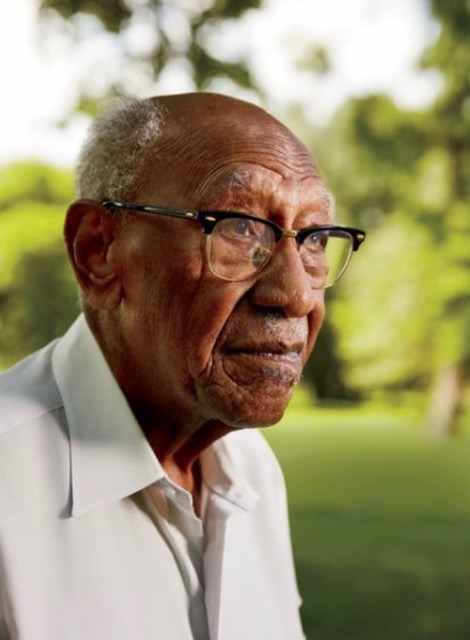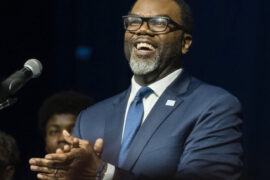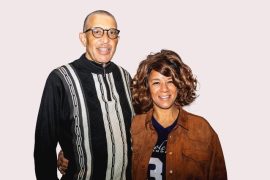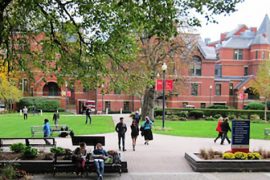Timuel Black is a highly respected educator, political activist, community leader, oral historian, philosopher, and a highly revered pundit on matters of race and social equality. He has celebrated 102 trips around the sun and his star has never shined brighter.
Born on December 7, 1918, in Birmingham, Alabama, Black’s great-grandparents were slaves and his grandparents were born as slaves and freed by the Emancipation Proclamation. His parents were sharecroppers who migrated to Chicago in order “to be able to fight back against white attackers, to get better jobs and be able to vote, and get a better education for their children.”
Black attended Burke Elementary School and DuSable High School in Chicago, and graduated from Roosevelt University and where he received his bachelor’s degree. He also earned a master’s degree from the University of Chicago. He has taught at a variety of high schools as well as colleges and universities. He is a pioneer in the black political movement and coined the phrase “plantation politics.”
Black has spent his life furthering the cause of social justice. He is the author of two volumes of oral histories (Bridges of Memory: Chicago’s First Wave of Black Migration and Bridges of Memory: Chicago’s Second Generation of Black Migration, Northwestern University Press, (2005 and 2008). The book chronicles black Chicago history from the 1920s to the present and is based on interviews he conducted.
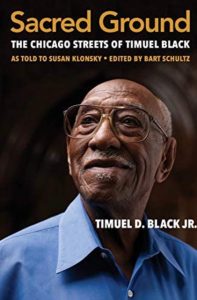 He is also the author of Sacred Ground: The Chicago Streets of Timuel Black which chronicles the life and times of this Chicago legend.
He is also the author of Sacred Ground: The Chicago Streets of Timuel Black which chronicles the life and times of this Chicago legend.
Sacred Ground opens in 1919, during the summer of the Chicago race riot, when infant Black and his family arrive in Chicago from Birmingham, Alabama, as part of the first Great Migration. He recounts in vivid detail his childhood and education in the Black Metropolis of Bronzeville and South Side neighborhoods that make up his “sacred ground.”
Black has advised and marched with Martin Luther King, Jr., helped more than 250,000 voters to help elect the late Harold Washington to become Chicago’s mayor, and helped Barack Obama win his Senate seat.
Black served in World War II and received four Battle Stars, the Croix de Guerre, and the Legion of Honour awards.
Timuel Black shared his thoughts with N’DIGO and proved that one can be WOKE at any age.
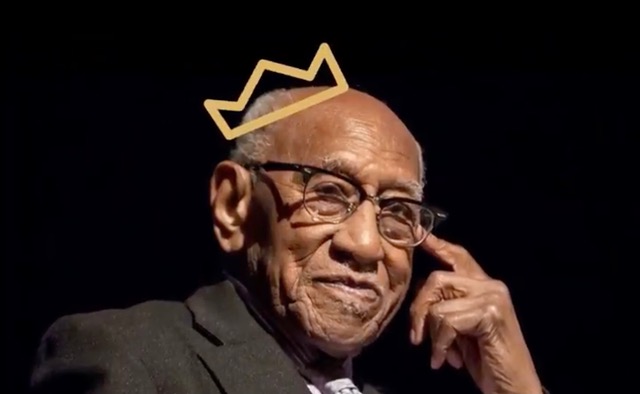
You recently celebrated your 102nd birthday and received so many well wishes from family and friends. How did that make you feel?
Timuel Black: My birthday made me responsible and capable of reaching 103-years-old (LOL)!
Did you have any specific birthday wishes?
I just wanted to be able to walk and talk (LOL)! I just wanted to listen and talk to N’DIGO and Hermene Hartman on or after my birthday! The reality is that I want to be asked these same questions next year!
You lived over a century and have seen so much change in the world. What were the most pivotal moments of change you have seen or experienced?
Well let’s see, I guess the lifetime of my experiences would be the fact I’ve been in Chicago for most of my 102 years. I’ve witnessed a lot of things from famous people that inspired me. Paul Roberson was one of those people and meeting Dr. Martin Luther King, Jr. Seeing and meeting musicians like Nat King Cole.
Serving in World War II and being able to return home with so many of my fellow soldiers. I didn’t volunteer to be in the army, I was drafted. But my unit was on the front line most of the time. We were an all-Black supply unit for the combat troops. The Germans tried to bomb us to cut off the supplies. The war was insane. Many men would break down, they just couldn’t handle it. I didn’t want to be there but promised myself that if I made it home, I would dedicate my life to peace and goodwill on earth.
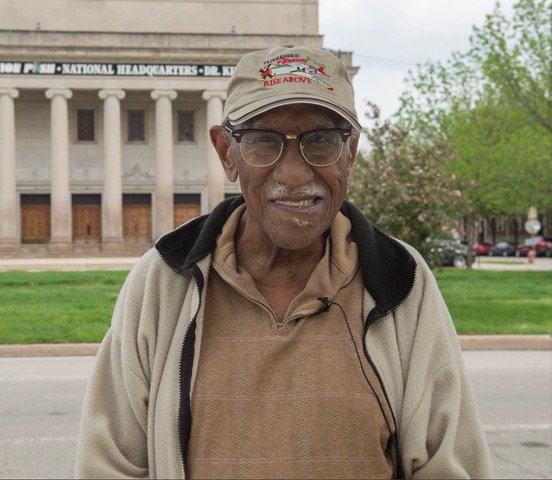
You dealt with racism as a young man while serving in World War II. What did you see that made you want to return home and make the world a better place to live?
Well, I what I observed in the war was the behavior of men was unbelievable. Race played a big role in that. Black soldiers could only be promoted to certain levels. Even though many of them were competent, still many of them wanted to be on the front line as combat soldiers. One example of that was Leon Dash, Jr.’s father and I served in the same unit. He was a fantastic man and should have been over the regimen or so. But there was a quota, a quota system and Black could only move up to a certain level. Sometimes the generals were less capable than the soldiers in their units.
I saw bodies piled up in the Buchenwald concentration camps in Germany. The bodies had been sliced up. Some of the survivors of the concentration camps saw their companions exterminated and turned into food. It’s hard to believe that some were so hungry that they didn’t want to die and would eat other people flesh to survive.
Why do you think that White men are intimidated by Black men?
I feel white men are not intimidated by Black men but are irritated by Black men. They hate the fact that Black men are given the same opportunities as them. They would rather see Blacks (although competent) excluded from the privileges and not attain levels in life that their middle class counterparts enjoy. They would rather control the schools to say Black people were not qualified. The Standardized test is one example of that. They were not designed to measure achievements but ability. These tests developed during World War I became a model for schools especially in the middle class White community.
I remember when Blacks were not allowed to play sports with White players. But when the team owners realized that those talented and skilled athletes could bring revenue to their teams, they were team Black. Please note when I was teaching, I had a student who was bright as can be, but didn’t do well on Standardized tests. He went on to grad school and recently retired at as a professor at Syracuse University.
It’s not Blacks against Whites, but Whites against Blacks and therefore against themselves.
What can be done to ease the racial strife in America?
Well, competitive capitalism by definition is competitive. Anyone who doesn’t meet certain standards will be excluded from opportunities.
The goal of competitive capitalism is to win. People don’t want to see Black people WIN.
There are far too many cultural and social systems that judge people by the color of their skin. Too many classes of people. Lower class, middle class… Sadly you have Blacks that are lighter than whites and don’t identify with their African culture.
Shifting gears, what’s your take on today’s current political situation? What’s your take on Donald Trump and his antics?
Years ago, before he was elected to the presidency I said if “we don’t bump Trump, he will put us in a dump and in which we will find it hard to jump.” We were stuck with him for 4 years. He lost the Popular vote and was elected by the Electoral college. He still wanted to keep Blacks controlled as in the slavery times. This is a democracy.
I don’t think he’s been a good president. His political behavior has alienated many of our European allies. He threatens their safety and ours. There are people that supported Trump are now sorry that they did.
I can’t even go to the bank now and get a little change. You ask me why? Because Trump’s lack of concern and neglect exposed us to the coronavirus. Now I have to STAND IN LINE. SIX FEET APART.
Black people has been the most negatively affected. Young Black folks particularly.
Why do you say that?
Because they have less availability to healthcare, to jobs and food. They are more vulnerable and don’t know how to not socialize during this pandemic.
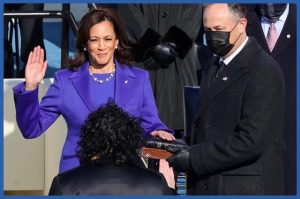 When Barack Obama was elected the first Black president, you were elated. How did you feel when Kamala Harris was elected the first female Black vice-president?
When Barack Obama was elected the first Black president, you were elated. How did you feel when Kamala Harris was elected the first female Black vice-president?
That’s the way it should be. The Declaration of Independence states “we hold these truths to be self-evident, that all men are created equal. ” It’s not the race or gender that matters.
Action speaks louder than words.
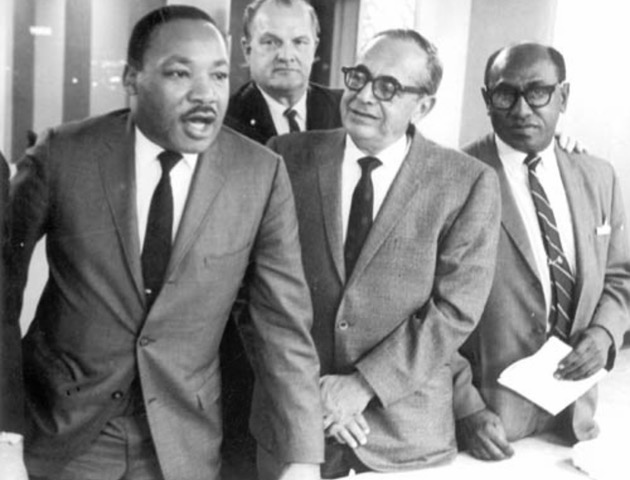
How do you think Martin Luther King Jr. would react to all the violent protesting demonstrated after George Floyd and others were killed by police?
He would have been much opposed to that. He would probably have organized a non-violent protest to protest the protest. Although it was hard to be supportive of the non-violent system, that’s the way he would have wanted it.
Were you angered, frustrated or confused by the protest?
I was absolutely angry! Violent people were encouraged by Trump to carry out his mission of violence and Hitler type antics.
In 1963 while running for Chicago City Council, you accuse Mayor Richard J. Daley of “plantation politics”. Do you think these practices still exist today in Chicago?
Yes, they still exist. Many politicians would love for us to go back to the plantations., where we didn’t have the right to vote or voice our opinions. They would love to see us return there.
What advice would you give the mayor to effectively run our city?
Well, I think that she should get people around her who represent in a liberal way (all the non-excluded groups – race, gender, ethnicities) to discuss the economic conditions of Chicago. She should bring leadership and educators together to talk about the distribution of opportunities for the less fortunate.
You have been called the consummate teacher. What advice would you give our younger generation today?
I would them the advice that my ancestors gave me. That’s to keep the faith and make yourself active. I’d let them know that the door is going to open. Be prepared to walk in when it does.
I’d tell them that Thurgood Marshall, Harold Washington and Barack Obama were examples of being prepared.
I would tell them to have faith in the future and believe that the future is in their hands.
Peace, justice and equality will make this a better world to live in.
Do you have any regrets in life? Anything you would do over?
No, regrets. I’ve experienced a life of fulfillment. I’ve done the best I could.
What’s the key to longevity and a prosperous life?
For me, I prepared for my future and took care of my health. There are three things that my father would always say to my mother mattie, and they are rules that I followed.
1. Pay your rent.
2. Have plenty of food
3. Get plenty of toilet paper (LOL)
With these three rules you can be as independent as you want to be. You don’t have to have more (toilet paper) just keep the faith. (LOL)


